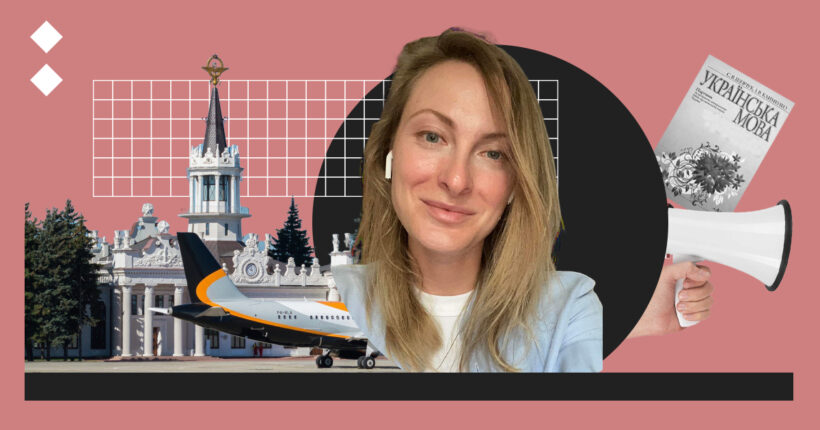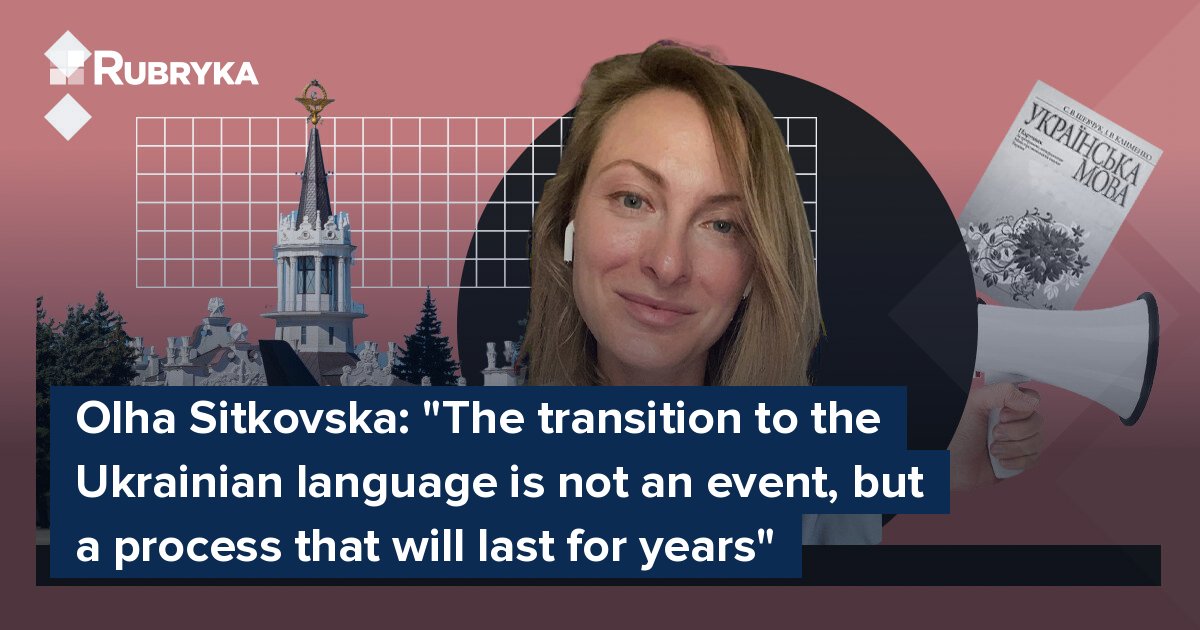
What is the problem?
"I wanted at least some connection with Ukrainians"
Sitkovska grew up in Kharkiv and received a degree in Economics but realized herself as a journalist and TV presenter on a local TV channel. She hosted morning broadcasts and her own show about cultural events. She was a news anchor in the last years before the full-scale war.
On the eve of a full-scale war, it was difficult for Sitkovska, like most Ukrainians, to believe that Kharkiv would be bombed. "I didn't have an emergency suitcase. Although there was a lot of talk about the war the day before, my psyche defended itself — I didn't believe it and distanced myself from this information," Sitkovska recalls. "Also, the night before February 24, when Russia started its full-scale invasion, I had the best sleep in my life. I haven't slept so deeply and soundly in a long time. The first thing I did when they called me and told me there was a war, I took a shower and washed my hair because I didn't know when I would be able to do such simple things."

Olha Sitkovska with her four-legged friend on February 24. Photo from the heroine's archive
At first, there was confusion, and not understanding what to do. After a series of air raids in Kharkiv, the decision came naturally. Together with her family and friends, she left her hometown by car.
"Somehow, my intuition worked so well that I filled the car up to a full tank the day before. We drove 17 hours to Kropyvnytskyi, stayed there for several days, then 10 hours to Uman, then Khmelnytskyi. We covered the distance that can be covered in an hour in 10. Ultimately, I realized I no longer had the strength to carry this responsibility and drive. That's why we decided to go abroad by bus," recalls Sitkovska.
At first, she lived with a friend in Krakow. It was difficult because the uncertainty and lack of understanding of what to do next were oppressive.
The psyche, to protect itself, looks for some actions, and then it becomes not so scary. "I felt confused because I had to leave. I wanted to at least do something to be in touch with Ukrainians," says Sitkovska.
What is the solution?
"It was not just a marathon, but a support chat"

Sitkovska during the recording of an educational video. Photo from the heroine's archive
Then Sitkovska decided that the connection could be maintained by helping to learn the Ukrainian language. "I am a Russian-speaking Ukrainian. It so happened that Russian was spoken in Kharkiv for many decades, particularly in my family. When I came to television at 24, I did not speak Ukrainian at all. I understood everything, but I couldn't say anything. I learned the language on my own. One might say I developed my own methodology. Then I thought — why not share my experience with others?"
Sitkovska's desire to share knowledge coincided with people's willingness to learn the Ukrainian language. She launched a language learning marathon on Instagram — the demand for it was insane.
"It was not just a marathon, but a support chat. People recorded stories, sent audio messages, and I corrected, gave recommendations, supported," the ex-reporter recalls.
Several thousand people subscribed to Sitkovska's pages then, and about 300 were constantly active. About a month and a half of constant interaction with followers and a difficult emotional state exhausted Olga, and she felt she needed a break.
Sitkovska moved to Italy, where she could recover and take up Ukrainianization with renewed strength.
How does it work?
"I sat in front of the TV, listened to the presenters, and repeated every word after them like a parrot"
Sitkovska continued teaching Ukrainian with more thorough preparation. She began to record short videos with all sorts of curiosities and vocabulary analysis, post them on social networks, and teach individually.
Sitkovska says that to successfully learn the Ukrainian language, you need to read aloud, record yourself on video to listen and analyze what works and what doesn't, and constantly consume Ukrainian content.
"When I was learning to speak Ukrainian, I just sat down in front of the TV, listened to the presenters, and repeated every word after them like a parrot. The problem during the transition from Russian to Ukrainian is not that a person does not know the words, but in the pronunciation," says the specialist.

Ola Sitkovska, photo from the heroine's archive
The teacher noticed that people are interested in authenticity. There is always a high demand for repressed words, for the way people used to speak. Videos with interesting facts about the language are also well received, for example, that the letter "f" is the least used in Ukrainian.
"When I tell about it, people share their experiences: 'Oh, that's how my grandmother used to speak in the Poltava region.' When such facts awaken memories and emotions in people, it gives me much energy. I feel a kind of kinship and fullness," says Sitkovska.
"I no longer invent what to talk about, but I start from what the audience is interested in"
Sitkovska's supporters and those willing to learn the Ukrainian language have increased and are already helping the expert to generate content. They write messages requesting to tell about a specific word or answer questions on a topic.
"I no longer invent what to talk about, but I start from what the audience is interested in," Sitkovska shares.

Olha Sitkovska. Photo from the heroine's archive
Sitkovska says she is constantly looking for sources of information, and one has to study and check a lot. "I read the works of philologists and works of educational institutions, and I study a lot of sources. Journalistic practice helps in this. It is necessary to take information and check whether it corresponds to reality because a lot can be written, but it is not always true," says the specialist.
Now, she has 3,500 followers on Instagram and 5,000 on Facebook. Sitkovska has just started TikTok, but some videos are already gaining 25 to 30 and even 95 thousand views.
Sitkovska's target audience is Ukrainians who want to switch to Ukrainian. Among them are compatriots from Kharkiv. These are both business people and public figures. "People come with a great desire to speak Ukrainian. They used to speak Russian because that's how life turned out. They were taught in Russian, but now they are doing a lot for Ukraine, and switching to the Ukrainian language is a continuation of their patriotic position. I'm very pleased to see how they responsibly treat it," says Sitkovska.
Anna Rudenko, a psychologist from Kharkiv, studied the Ukrainian language with Sitkovska for five months. The psychologist admits that she appreciates Sitkovska for her clarity, understanding, and high level of teaching. "She was attentive to my mistakes and efforts, and we always found a common language. Thanks to her lessons, I significantly increased my level of the Ukrainian language. She is an unsurpassed teacher," Anna shared.
Sitkovska also deals with foreigners. Among the students is, for example, a Colombian from the USA, Eduardo. He is a fan of everything Ukrainian.
"He lived in Kyiv for several years, has a Ukrainian wife, and admires everything Ukrainian — from varenyky to vyshyvanka. He is in Ukraine on business and likes to communicate in Ukrainian. That is why he is studying it," says Sitkovska.
Eduardo himself said in a conversation with Rubryka that, for him, Sitkovska became a real ambassador of the Ukrainian language.
"Passion, devotion, tenacity, generosity. These four characteristics are deeply rooted in the yellow-blue basis of Ukrainian culture, which captured the world in February 2022. Sitkovska skillfully embodies these traits of the ambassador of the Ukrainian language, trying to convey this aesthetic and melodic language to those of us who would ever want to freely recite Taras Shevchenko or sing about a red viburnum in a meadow," shares Eduardo.
Sitkovska says that teaching the Ukrainian language has already become a profession for her, and she is developing in this area. "I took a course on teaching Ukrainian to foreigners. I find textbooks and various materials that I can use in teaching. I am against learning a language only according to the rules. You can perfectly know the grammar rules and not utter a word. Those who watch movies and listen to songs already talk a little. My students love this funny song, "Roasted Boar with Mayonnaise," by the band "Step." They laugh, and I say they will not die of hunger because they will know how and what to order in a restaurant."
"The introduction of the Russian language took place gradually, and the transition to Ukrainian is also gradual"

Olha Sitkovska. Photo from the heroine's archive
Sitkovska has offered students to listen to the songs of modern performers and discovered for herself that many singers have songs in which the word "home" sounds.
Sitkovska emphasizes that the transition process to the Ukrainian language is gradual and should be organic. "Not everyone is lucky enough to be born in Volyn or Ternopil, Ukrainian-speaking regions, and speak Ukrainian from childhood. This does not mean a person born in Kharkiv who speaks Russian is somehow worse. The introduction of the Russian language took place gradually, and the transition to Ukrainian will also be gradual."
There are many psychological barriers. A person spoke Russian all their life, and when the war started, they were told they were bad because they spoke the wrong language. Of course, the person would begin to defend themself. It is necessary to realize that the transition to the Ukrainian language is not an event but a process that will last for years. The age factor is also important. It is easier for someone under 40 to transition than someone in their 50s. These are biological processes that should be taken into account. You need to switch to Ukrainian through love and motivation."
The most significant support for Sitkovska is subscribers who share their emotions and talk about their successes. "We often look at something on social networks and even forget to like it — we scroll further, but feedback is important for those who create content, and I feel it among my followers. People want this contact, and for me, it is fuel that helps to move on," says Sitkovska.
The teacher says that it is vital to do things in a comfortable mode, having the appropriate internal resources for this so as not to burn out quickly. Sitkovska speaks English, French, and a little Italian. Now, she lives in Barcelona but admits that she does not dare to speak Spanish yet — English is enough for communication here.
Sitkovska is already planning the next Ukrainian language marathons. "I want to help people speak Ukrainian more confidently. Few people like to sit and do tasks, so it will be a creative marathon," Sitkovska shares her plans.
She is also interested in studying the psychology of the voice, so the second marathon will be on this topic. "It's about how we talk, why we talk like that, how to support ourselves with our voice, find inner support, and convey our opinion. This is a fascinating topic. For example, people who talk a lot without stopping — this is about a bad connection with their own needs. They drown out the inner feelings of their own failure with constant noise," the teacher shared her observations.
Meanwhile, thousands of people continue to switch to the Ukrainian language, study it, and make it truly their native language. Often, it costs a lot of effort, so let's support those not afraid of such a challenge.

"I was told: 'Who cares about Ukrainian, it's not even Russian'": How Ukrainian women teach foreigners the Ukrainian language

STEM girls: Ukrainian initiative overcomes gender stereotypes in science and technology studies specialties






